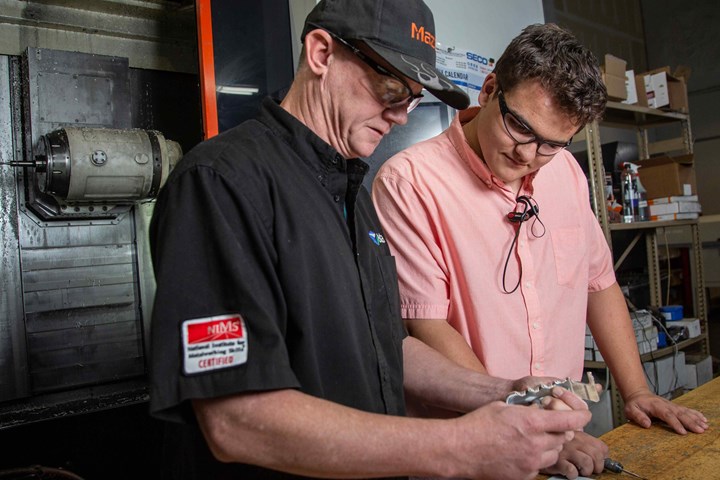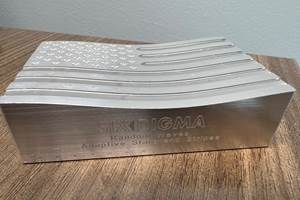Solving the Education Gap
One way that shops can address the skills gap and the looming labor dilemma is to start making their own talent.
Share







Gabe Wenaas, Programming Engineer and NIMS On The Job Trainer (OJT) teaches Jacob Pederson, second year apprentice at Reata Engineering.
Lack of labor and talent is the number one growth inhibitor for American manufacturers, according to the 2018 National Manufacturing Outlook and Insights report compiled by EKS&H and the Leading Edge Alliance. In fact, I know manufacturers who have turned down orders due to lack of skilled workers. Here in Colorado, where the unemployment rate is hovering around 2 percent, many manufacturers have resorted to poaching talent from neighboring manufacturers or hiring from out of state. Both practices are inflationary and detrimental to our industry. Management consulting firm McKinsey & Co. reports that recruiting, hiring and training cost Colorado businesses $24,000 for each in-state employee, a price that is expected to escalate at the rate of 21 percent over the next five years.
Workforce problems are compounded because our current system of career, technical education and middle-skills training has a sustainability problem. Schools rarely have the funding to acquire the state-of-the-art manufacturing equipment used by our industry today. Moreover, they often stuggle to keep curiculucm current with the rapid pace at which new technologies are adopted in the workplace.
Colorado manufacturers have come to realize we need to stop buying our workforce and relying on schools as the exclusive producer of that talent. Instead, we need to start making our workforce through apprenticeships.
I am proud to be one of the first companies to hire a youth apprentice as part of modern youth apprenticeship program. CareerWise was created with the vision to create a youth apprenticeship system that meets employer and community needs, improves student outcomes and delivers a postive return on investment to hiring businesses.
At the end of their sophomore year of high school, potential apprentices applied to our company for a position that would begin during the summer. The hiring process was competitive, just like it is for any other professional position, and I was able to choose the students that I thought were the best fit for our organization. During the school year, the apprentices working in our shop spend a portion of their week learning at school and a portion learning on the job while making parts for our customers.
CareerWise, a non-profit organization, serves as the intermediary between our company and the local school district. Understanding our company’s needs, CareerWise works with the school district to create career competencies and ensure apprentice work and school schedules are optimized.
The success of the youth apprenticeship program on our shop floor was immediately visible. The apprentices arrive eager to learn and have proven to be a great asset to the company. Because they have been raised in the digital age, they can learn the advanced equipment at a fast rate. Given the quality of their work and the speed at which they are learning, it is easy to forget that these apprentices are still in high school.
Yes, making our workforce through the youth apprenticeship program has been rewarding for my company, Reata Engineering & Machine Works Inc. The tangible benefits to me include reduced hiring/training costs and creating a pipeline of loyal employees. However, the advantages reach far beyond the tangible, bottom-line benefits. It is extremely rewarding to see young men and women eager to engage in a manufacturing career.
The words from a mother of one of our apprentices capture this better than I could ever say: “I believe the CareerWise opportunity afforded Jacob has redirected him on a much more successful path than that which he was experiencing as a full-time high school student prior. In years past, I struggled every day to get him out of bed in the morning and headed for school. Since becoming an apprentice, Jacob has taken responsibility for himself completely. I have not had to wake him a single morning in his senior year. He truly wants to get to school and then on to Reata every day.”
About the Contributor
Grady Cope
Grady Cope is president and CEO at Inc., a company he started more than 25 years ago. He is the past national chair of the National Tooling and Machining Association (NTMA) and current chairman of the Colorado Advanced Manufacturing Association.
Related Content
Finding the Right Tools for a Turning Shop
Xcelicut is a startup shop that has grown thanks to the right machines, cutting tools, grants and other resources.
Read MoreBuilding Machines and Apprenticeships In-House: 5-Axis Live
Universal machines were the main draw of Grob’s 5-Axis Live — though the company’s apprenticeship and support proved equally impressive.
Read MoreShop Tour Video: You've Never Seen a Manufacturing Facility Like This
In the latest installment of our “View From My Shop” series, explore Marathon Precision’s multi-process approach to manufacturing, where blacksmiths and hand-forged dies meet state-of-the-art CNC machining. Discover how restoring classic muscle cars and building custom art projects creates a dynamic shop culture — and draws top talent to this unique and innovative metalworking facility.
Read MoreHow I Made It: Nushrat Ahmed: CNC Swiss Operator
By day, 21-year-old Nushrat Ahmed is a CNC Swiss operator making automotive parts. By night, she handcrafts crocheted items.
Read MoreRead Next
Last Chance! 2025 Top Shops Benchmarking Survey Still Open Through April 30
Don’t miss out! 91ÊÓƵÍøÕ¾ÎÛ's Top Shops Benchmarking Survey is still open — but not for long. This is your last chance to a receive free, customized benchmarking report that includes actionable feedback across several shopfloor and business metrics.
Read MoreMachine Shop MBA
Making Chips and 91ÊÓƵÍøÕ¾ÎÛ are teaming up for a new podcast series called Machine Shop MBA—designed to help manufacturers measure their success against the industry’s best. Through the lens of the Top Shops benchmarking program, the series explores the KPIs that set high-performing shops apart, from machine utilization and first-pass yield to employee engagement and revenue per employee.
Read MoreAMRs Are Moving Into Manufacturing: 4 Considerations for Implementation
AMRs can provide a flexible, easy-to-use automation platform so long as manufacturers choose a suitable task and prepare their facilities.
Read More





















